
AOC claps back at Justice Alito for saying Congress can’t have oversight of Supreme Court
New York congresswoman Alexandria Ocasio-Cortez criticised Supreme Court Justice Samuel Alito on Friday, after the high court jurist claimed the US court was above any regulation from Congress. Democrats in the Senate have been pushing for a new law that would require the Supreme Court to adopt a binding ethics code and new enforcement regulations to assure justices stick to it, after a bruising series of ethics scandals on the nation’s top appellate court. “What a surprise, guy who is supposed to enforce checks and balances thinks checks shouldn’t apply to him,” Ms Ocasio-Cortez wrote on social media. “Too bad! Corruption and abuse of power must be stopped, no matter the source. In fact, the court should be *most* subject to scrutiny, bc it is unelected & life appointed.” The pushback was in response to recent comments Mr Alito gave in an interview with The Wall Street Journal, where the right-leaning judge said, “I know this is a controversial view, but I’m willing to say it...No provision in the Constitution gives them the authority to regulate the Supreme Court – period.” “The court’s financial disclosure requirements are a law, passed by Congress; its recusal requirements are a law, passed by Congress; and the body that implements financial disclosure and code of conduct issues is the Judicial Conference, a body created by Congress,” Rhode Island senator Sheldon Whitehouse said earlier this month. “Please let’s not pretend Congress can’t make amendments to laws Congress has passed or oversee agencies Congress has created,” he said. Mr Alito was in the spotlight last month after ProPublica revealed the justice had travelled to a fishing trip in a remote part of Alaska onboard a private jet belonging to billionaire hedge fund manager Paul Singer, a wealthy Republican donor who’s had cases before the Supreme Court. The trip wasn’t disclosed on Mr Alito’s yearly financial forms, a potential violation of federal law, though he disputes he did anything wrong. Earlier this year, another Republican-appointed judge, Clarence Thomas, found himself facing similar allegations of improper conduct. ProPublica detailed longstanding ties between him and Harlan Crow, another conservative-leaning billionaire. Mr Crow took Mr Thomas around the world on lavish vacations, and bought over $133,000 dollars’ worth of property from the justice. These ties were also not disclosed. The ensuing scandal, in which Mr Thomas insisted he did nothing wrong, seemed to trigger an avalanche of issues at the court. Jane Roberts, wife of Chief Justice John Roberts, has also come in for scrutiny for her business activities. Between 2007 and 2014, she made more than $10m working as a legal recruiter, matching attorneys with top firms, at least one of which argued before her husband, Insider reported, citing information from a whistleblower complaint. The windfall made her one of the highest-paid legal recruiters in the country at the time. “When I found out that the spouse of the chief justice was soliciting business from law firms, I knew immediately that it was wrong,” the whistleblower, former colleague Kendal B Price, told the outlet. “During the time I was there, I was discouraged from ever raising the issue. And I realized that even the law firms who were Jane’s clients had nowhere to go. They were being asked by the spouse of the chief justice for business worth hundreds of thousands of dollars, and there was no one to complain to. Most of these firms were likely appearing or seeking to appear before the Supreme Court. It’s natural that they’d do anything they felt was necessary to be competitive.” Ms Roberts’s firm at the time said in a statement to the outlet she maintained “the highest standards: Candidate confidentiality, client trust, and professionalism”. One of the high court’s liberals has also come under fire. Elena Kagan was a speaker at a 2017 event in Aspen, nicknamed “billionaire mountain”, where members of the Aspen Institute could pay $10,000 a year for a membership in the Justice Circle, where high-profile legal minds would speak at exclusive conclaves. At these events, corporate executives and lawyers, some of whom had business with the court, interacted with the justices, reported the outlet. Read More Harlan Crow says the Constitution bars investigation into his relationship with Clarence Thomas Senate Judiciary panel to consider ethics rules for Supreme Court Senators call for Supreme Court to follow ethics code like other branches of government Automaker Tesla is opening more showrooms on tribal lands to avoid state laws barring direct sales Justice Alito says Congress lacks the power to impose an ethics code on the Supreme Court Brazil's Indigenous chief fighting to save Amazon urges President Lula to defend people's rights
2023-07-29 12:22

Niger adds to growing list of countries in the Sahel run by the military
Mutinous soldiers in Niger this week overthrew the democratically elected government of President Mohamed Bazoum, adding to a growing list of military regimes in West Africa’s Sahel region and raising fears of regional destabilization. The Sahel, the vast arid expanse south of the Sahara Desert, faces growing violence from Islamic extremists, which in turn has caused people to turn against elected governments. The military takeovers have followed a similar pattern: The coup leaders accuse the government of failing to meet the people’s expectations for delivering dividends of democracy. They say they will usher in a new democratic government to address those shortcomings, but the process gets delayed. Karim Manuel, west and central Africa analyst for the Economist Intelligence Unit, says the military governments threaten to unwind democratic gains made not just in the Sahel region but in the broader West Africa region. “This increases political instability going forward and makes the situation on the ground much more volatile and unpredictable. Regional stability is undermined as a result of these coups,” Manuel said. The Sahel region comprises Senegal, Gambia, Mauritania, Guinea, Mali, Burkina Faso, Niger, Chad, Cameroon and Nigeria. Here are countries in the Sahel with military regimes: MALI: The Sahel’s latest wave of coups kicked off in Mali in August 2020 when the democratically elected President Ibrahim Boubacar Keïta was overthrown by soldiers led by Col. Assimi Goita. The military was supposed to hand power back to civilian rule within 18 months. However, seven months into the transition process, the military removed the interim president and prime minister they had appointed and swore in Goita as president of the transitional government. Last month, Malian voters cast ballots on a new draft constitution in a referendum that the regime says will pave the way for new elections in 2024. BURKINA FASO: Burkina Faso experienced its second coup in 2022 with soldiers ousting Lt. Col. Paul Henri Sandaogo Damiba about eight months after he helped overthrow the democratically elected President Roch Marc Kaboré early in the year. Capt. Ibrahim Traore was named as the transitional president while a national assembly that included army officers, civil society organizations, and traditional and religious leaders approved a new charter for the West African country. The junta has set a goal to conduct elections to return the country to democratic rule by July 2024. SUDAN: Sudan slipped under military rule in October 2021 when soldiers dissolved the transitional government of Prime Minister Abdalla Hamdok as well as the Sovereign Council, a power-sharing body of military officers and civilians. That took place weeks before the military was to hand the leadership of the council to civilians and nearly two years after soldiers overthrew the longtime autocrat Omar al-Bashir amid deadly protests. Eighteen months after the coup and amid the hopes for a transition to democracy, fighting broke out between the Sudanese army and the paramilitary Rapid Support Forces (RSF). The conflict has resulted in the deaths of hundreds with no end in sight. CHAD Chad has been under military rule since April 2021 when President Idriss Deby, who ruled Chad for more than 30 years, was killed while battling against rebels in the hard-hit northern region. His son, Gen. Mahamat Idriss Deby, took power contrary to constitutional provisions and was named the interim head of state with an 18-month transitional process set in place for the country’s return to democracy. By the end of the 18 months period, the government extended Deby’s by two more years, triggering protests that the military suppressed. Read More Ukraine war’s heaviest fight rages in east - follow live Charity boss speaks out over ‘traumatic’ encounter with royal aide No clarity about who's in charge in Niger, 2 days after mutinous soldiers ousted the president How the attempted coup in Niger could expand the reach of extremism, and Wagner, in West Africa Mutinous soldiers say they've taken Niger. The government says a coup won't be tolerated
2023-07-29 06:46
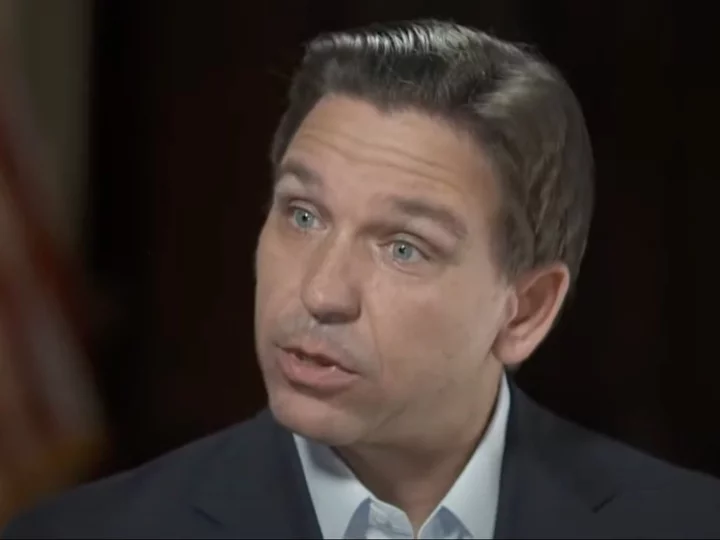
DeSantis cornered on his Bud Light boycott after threatening legal action over stock drop
Ron DeSantis threatened Bud Light’s parent company with legal action after the beer brand’s sales and stocks dropped because of right-wing backlash and transphobic boycotts over a transgender influencer’s sponsored social media post – a boycott that the Florida governor supported. Mr DeSantis, who is seeking the 2024 Republican nomination for president, defended the boycott in a lengthy, wide-ranging interview with Megyn Kelly on SiriusXM after outlining the potential impacts of poor sales and stock prices on the state’s pension fund, which holds stock in Anheuser-Busch and InBev. The right-wing news personality asked whether Mr DeSantis was “using government to punish citizens for political wrongthink,” an accusation often thrown at Democratic officials by conservatives. “No. Take Anheuser-Busch. We’re not punishing them. They departed from business practices by indulging in social activism. That has caused a huge problem for their company, and their stock price has gone down,” Mr DeSantis said. “Well, our pension fund in Florida holds Anheuser-Busch/InBev stock. So it’s actually hurt teachers, it’s hurt cops, it hurts firefighters who depend on that pension fund, and so –.” “Didn’t you support the boycott against them?” Ms Kelly interjected. “No, I did, but that’s just as a personal thing, but I mean we didn’t have, like, the state government, you know, necessarily, you know, putting power about it, but as an American I said I’m not doing Anheuser-Busch, I’m not doing Bud Light.” In a recent letter to a state agency that manages retirement accounts for state workers, Mr DeSantis suggested that InBev “breached legal duties to its shareholders” by associating with “radical social ideologies” after trans influencer Dylan Mulvaney posted a video to her Instagram account with a Bud Light can in May. The video sparked widespread outrage among Republican officials and right-wing personalities who have filmed themselves dumping out beers, shooting bottles and cans, and pledging to boycott Budweiser products because a trans person was featured in marketing. “All options are on the table,” Mr DeSantis wrote in his letter, though it’s unclear what the state can do to challenge the multinational company’s business decisions. “When you take your eye off the ball like that, you’re not following your fiduciary duty to do the best you can for your shareholders, so we’re going to be launching an inquiry about Bud Light and InBev, and it could be something that leads to a derivative lawsuit on behalf of the shareholders of the Florida pension fund,” Mr DeSantis told Fox News host Jesse Watters on 20 July. Ms Kelly also pressed the governor on his administration’s actions against the Walt Disney Company and its sprawling theme park campus in the state. The company and the DeSantis administration are suing one another following a feud over Disney’s opposition to what opponents have called Florida’s “Don’t Say Gay” law that boiled over into political and legal battles that could shape the company’s business in the state. The governor has overseen what is effectively a state takeover of the municipal board that managed Disney’s park campus for decades, a move that the company has called a “targeted campaign of government retaliation”. “Why can’t Disney oppose your law … without being punished by the state?” Ms Kelly asked the governor. Mr DeSantis accused the company of “weaponising” state subsidies to speak out against state policy. The Reedy Creek Improvement District was first created in 1967 to give Disney control of its land use, zoning rules and public services without putting a tax burden on Florida residents. “It’s not about entitlement,” Ms Kelly said. “If I go to my boss and I say, ‘You sexually harassed me,’ and then suddenly he reduces my salary from $200k to $100k, that’s retaliation.” Mr DeSantis dismissed the comparison. He accused Disney of supporting “sexualising kids” and putting its “corporate weight” behind that effort, as his administration and national agenda launches a crusade against inclusive classroom instruction and honest discussion of gender, sexuality, race and racism, as well as a series of policies that threaten LGBT+ people and gender-affirming healthcare for both transgender minors and trans adults. A motion filed in US District Court on 26 June argues that Mr DeSantis is entitled to “legislative immunity” that shields the actions of the governor and lawmakers in “the proposal, formulation, and passage of legislation.” Attorneys for Mr DeSantis argue that the governor and the secretary of Florida’s Department of Economic Opportunity are both “immune” from the suit. In filings this week, attorneys for the company argued that the governor is trying to evade responsibility for overseeing laws that “punish residents for political statements violating a state-prescribed speech code”. Read More Tim Scott rebukes DeSantis for new Florida Black history curriculum Republican congressman faces wrath of DeSantis campaign with call to ‘correct’ Black history standards DeSantis v Disney: Why Florida’s governor is at war with the Mouse
2023-07-29 05:53
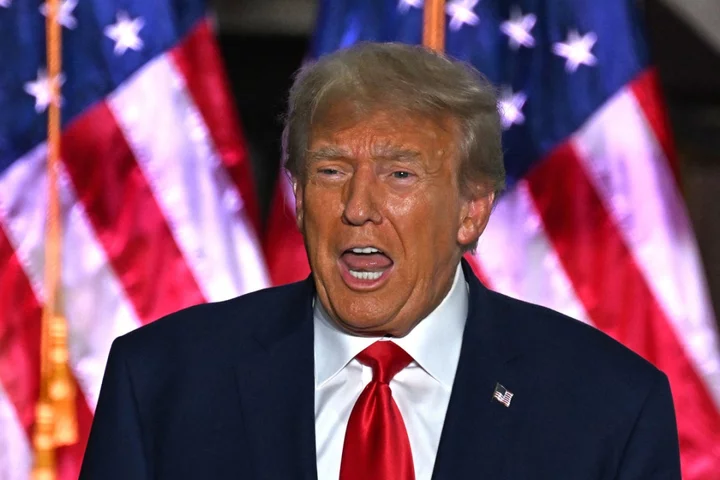
Mystery Mar-a-Lago employee referenced in superseding Trump indictment is identified
The unnamed “Trump employee 4” mentioned in the superseding federal indictment against former President Donald Trump has been identified as Yuscil Taveras, the director of information technology at Mar-a-Lago. CNN and NBC News revealed the name on Friday. The reports said that Mr Taveras oversaw the surveillance camera footage at the property. He had a conversation with the third co-defendant named in the superseding indictment – Carlos De Oliveira – who was a maintenance supervisor at Mar-a-Lago. He suggested their chat “remain between the two of them,” the indictment states. Mr De Oliveira asked to have a private discussion in an “audio closet.” Mr De Oliveira then asked how long the server retained footage, to which Mr Taveras responded that he believed it was approximately 45 days. Mr De Oliveira then said “the boss” wanted the footage deleted. But Mr Taveras said that not only did he not know how to do that but “that he did not believe that he would have the rights to do that,” the filing states, adding that Mr De Oliveira would have to reach out to the supervisor of security. Reiterating the wishes of “the boss,” Mr De Oliveira then asked, “what are we going to do?” CNN reported that special counsel Jack Smith’s team had previously heard testimony about “odd conversations” about surveillance footage between Mr Taveras, and two other co-defendants, Carlos De Oliveira and another employee, Walt Nauta. Thursday’s superseding indictment added more charges to the existing pile against Mr Trump. His 2024 presidential campaign dismissed the charges in a statement, calling them “nothing more than a continued desperate and flailing attempt by the Biden Crime Family and their Department of Justice to harass President Trump and those around him.” On Friday morning, the former president said in a radio interview that regardless of whether he is convicted or incarcerated, he would continue to run for president. Read More Trump indictment – live: Trump vows to continue 2024 run in jail as new charges added to classified docs case The latest charges against Trump answer one question and raise several more Trump slams Jack Smith’s superseding indictment in classified docs case as ‘election interference’
2023-07-29 05:48

Carlee Russell charged after falsely reporting kidnapping
Carlee Russell, the 25-year-old Alabama woman who claimed she went missing and later alleged that she had been kidnapped, has been charged. The arrest warrant was issued earlier on Friday 28 July, Hoover Police Chief Nicholas Derzis said in a news conference. Hoover police arrested Ms Russell “for her actions related to faking her kidnapping and subsequently making false statements to detectives.” Chief Derzis continued, “Her decisions that night created panic and alarm for citizens of our city and even across the nation.” Numerous law enforcement agencies worked “tirelessly” to bring Ms Russell home to her family and to find a kidnapper “that we know now never existed.” She turned herself into the Hoover City Jail for charges of false reporting to law enforcement authorities, which is a misdemeanour, and falsely reporting an incident, also a misdemeanour, he said. Each charge had a bond set at $1,000 and can result in up to a year in jail and a potential fine of $6,000 if convicted. She posted bond and was released from jail. Chief Derzis also said they have not found out where she was in the 49 hours she went missing. Ms Russell’s attorney issued a statement: “There was no kidnapping on Thursday, July 13, 2023. My client did not see a baby on the side of the road. My client did not leave the Hoover area when she was identified as a missing person. My client did not have any help in this incident — this was a single act done by herself.” The statement continued, “My client was not with anyone or any hotel with anyone from the time she was missing. My client apologizes for her actions to this community, the volunteers who were searching for her, to the Hoover Police Department and other agencies as well and to her friends and family. We ask for your prayers for Carlee as she addresses her issues and attempts to move forward, understanding that she made a mistake in this matter.” Ms Russell disappeared on 13 July after calling 911, claiming she had seen a toddler walking on the side of an Alabama interstate. But by the time police arrived at the scene, neither Ms Russell nor the toddler were anywhere to be found. This sparked an investigation. Mysteriously, 49 hours after she vanished, the 25-year-old arrived at home. She was reportedly in a state of shock, and eventually told her family, boyfriend, and then detectives a harrowing story of her survival over the last two days. Ms Russell’s explanation involved being abducted by a white man with “orange hair” and she was forced to undress and pose for photos. Miraculously, though, she claimed, she was able to escape and flee into the woods and make it home safely. Shortly after that is when her story began to unravel: her search history revealed that she had looked up the movie Taken, “how to take money from a register without being caught,” and questions surrounding amber alerts. Police voiced doubts about her abduction publicly. “To think that a toddler, barefoot, that could be three or four years old is going to travel six football fields without getting on the roadway, without crying ... it’s very hard for me to understand,” Mr Derzis said during a previous press conference. The police chief said investigators had their doubts from the beginning, but on 24 July, he admitted, “We know that it was a hoax.” Read More Carlee Russell charged with filing fake police report in connection to kidnap hoax – updates Three unanswered questions in the mysterious case of Carlee Russell Carlee Russell claimed she was kidnapped by a man with orange hair. It was all a lie
2023-07-29 03:18

Alicia Navarro tells investigators ‘nobody hurt me’ in mysterious reappearance as police deny arrest rumours
A missing Arizona teenager who mysteriously turned up at a Montana police station four years after her disappearance has told police that she was not harmed, according to a video released by police. Alicia Navarro, 18, stunned officers in the small town of Havre, 40 miles from the Canadian border, when she showed up alone on Sunday and identified herself as a missing teenager from the Phoenix suburb of Glendale. Nearly a week on from her reappearance, very little is known about where the teenager has been, or if any suspects have been identified. In a newly released video interview, a Glendale detective asks Ms Navarro: “Did anybody hurt you in any way?” “No, no one hurt me,” she replied. The detective then asks: “OK, because our goal is we just want to make sure that you’re safe.” “I don’t, I don’t, ummm... I understand that,” she responds. In a separate video, Ms Navarro thanks police. “Thank you for offering help to me,” she says. Ms Navarro disappeared from her Glendale home in September 2019 at the age of 14, sparking a vast search operation involving police, the FBI and the Center for Missing and Exploited Children. Her mother Jessica Nuñez has previously said the teenager was on the autism spectrum, which made her shy in some social situations, and that she had left a note in her bedroom saying she had run away. “I will be back. I swear. I’m sorry,” she wrote in a note days before her 15th birthday, before taking her laptop and phone and hopping over a backyard fence. A private investigator hired by the family told the New York Post Ms Navarro had only spoken briefly to her mother. Trent Steel told the Post the family was thrilled she had been found safe, but that the teenager had “not made her intentions clear”. Glendale police Lt Scott Waite said this week that investigators were looking into all possible explanations for her disappearance, including kidnapping. Mr Waite described the teenager’s reunion with her mother as “emotionally overwhelming”. Ms Navarro reportedly apologised for “what she has put her mother through.” Ms Nuñez previously told 12News that she believed her daughter had been lured away by a predator. In a video posted to her Facebook account on Wednesday, Ms Nuñez told her thousands of followers: “I want to give glory to God for answering prayers and for this miracle.” In a statement released on Friday through the Anti-Predator Project, her family thanked law enforcement, activists and the media. “It is a blessing that after being missing for so long Alicia can come back home,” the statement reads. “If there is anything that Alicia’s story has taught us is that you can never give up hope.” According to the Associated Press, a man living in an apartment a few blocks from the Havre police station was arrested on Wednesday night. Witnesses told the AP that 10 heavily armed uniformed and undercover officers arrived at the address at about 8pm and took a suspect away in handcuffs. On Friday, Glendale police denied that there have been any arrests in connection with Ms Navarro’s disappearance. Read More Mystery as teenager walks into Montana police precinct four years after she went missing in Arizona Mother says daughter’s return after four years brings hope to all parents of missing children
2023-07-29 02:47
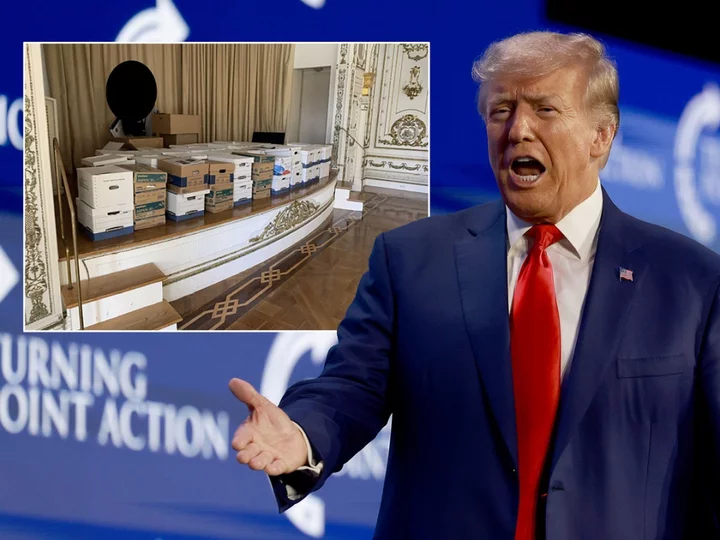
Trump indictment – live: Trump vows to continue 2024 run in jail as new charges added to classified docs case
Donald Trump has vowed to continue his 2024 presidential run from prison if necessary after the Mar-a-Lago boxes case became subject to a superseding indictment late on Thursday. The former president and aide Walt Nauta were hit with a new set of federal charges related to alleged mishandling of classified information after leaving the White House. Federal prosecutors accuse him of retaining defence information and conspiring with club employee Carlos De Oliveira to delete security footage to hide evidence of misconduct. On Friday morning, radio host John Fredericks asked Mr Trump if conviction and sentencing in one of the cases against him would stop his White House campaign. The former president assured him that he would continue to run, even while incarcerated, adding that there is nothing in the Constitution to stop him. Meanwhile, a separate federal grand jury is considering indicting Mr Trump on charges over the January 6 Capitol riot and his efforts to overturn the 2020 presidential election. Last week, Mr Trump received a letter from special counsel Jack Smith’s office saying he is the target of their investigation. The former president’s legal team met with prosecutors on Thursday morning in preparation for the expected indictment. Read More Trump hit with more charges as Mar-a-Lago worker added to documents case Iran war plans, deleting security footage, a third defendant: Key takeaways from new Trump documents charges Carlos De Oliveira: Who is second Trump aide now charged in Mar-a-Lago secret documents case
2023-07-29 02:25
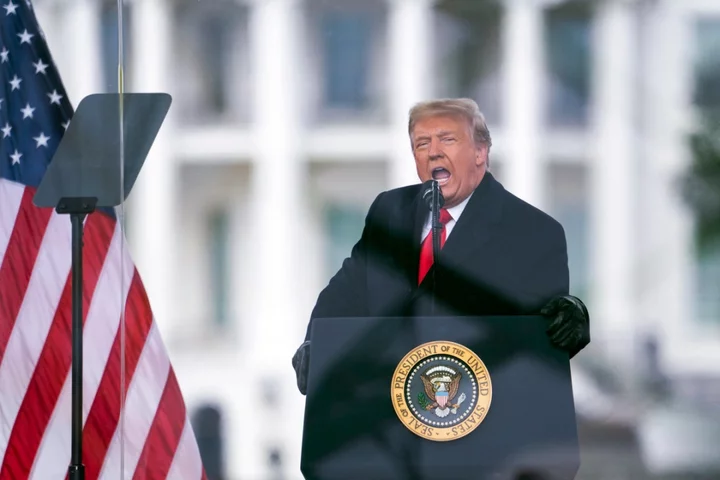
Trump has one-in-three chance of facing judge he appointed in special counsel indictment
Donald Trump is widely expected to be indicted imminently by Justice Department special counsel Jack Smith over his efforts to overturn the 2020 US presidential election result and his role in inciting the Capitol riot of 6 January 2021. Should that happen and he is brought to trial in Washington DC, Mr Trump would appear before a judge selected at random to oversee the case in accordance with the local rules. However, since he was the 45th president of the United States, Mr Trump stands a one-in-three chance of coming up against a jurist he personally appointed. Four of the 12 district judges currently active in DC – Judges Timothy Kelly, Trevor McFadden, Dabney Friedrich and Carl Nichols – were elevated to their current positions during the Republican’s four years in the White House between 2017 and 2021, meaning, at least at that point, he believed them to be politically sympathetic to his own values. Both Judge McFadden and Judge Nichols have raised eyebrows since then through their handling of January 6 defendants, the former delivering the only acquittal in a bench trial resulting from the failed insurrection and attempting to waive grand jury secrecy in court and the latter finding himself in disagreement with no fewer than 10 of his peers when he ruled that the Justice Department could not charge the accused rioters with obstruction of an official. The remaining eight active justices were appointed by either Barack Obama or Joe Biden, which, following the same logic, suggests they are likely to have more Democratic leanings. The ranks of DC’s senior judges, meanwhile, include veterans appointed during the Ronald Reagan, Bill Clinton and George W Bush administrations, two of whom – Emmet Sullivan and Amy Berman Jackson – have a recent track record of making enemies of Trumpworld luminaries. Judge Sullivan told Mr Trump’s short-lived first national security adviser Michael Flynn in 2018 that might have been charged with “treason” over his undeclared lobbying on behalf of the Turkish government, drawing the ire of the MAGA movement, while Judge Jackson attracted headlines when she issued a gag order against self-styled Republican political fixer Roger Stone after he posted a picture of her on Instagram with a rifle’s crosshairs zeroing in on her forehead. As for DC’s juror pool, citizens of the nation’s capital have distinguished themselves in recent years through their careful and considered handling of January 6 cases, despite voting overwhelmingly for Mr Biden at the ballot box and witnessing the violence of that ignominious day first-hand on their own doorsteps. For all that, Brandon Van Grack, a former federal prosecutor who worked on special counsel Robert Mueller’s investigation into Mr Trump’s alleged ties to Russian election meddling in 2016, argues that too much emphasis is placed on a justice’s supposed political affiliations, especially among the conspiracy-minded. “There are so many exceptions to it,” he told The Messenger. “I think it’s just too much shorthand for people who don’t know the court and who don’t know the judges.” Read More Trump news – live: Trump and aides charged with plotting to delete security footage in classified docs case Trump slams Jack Smith’s superseding indictment in classified docs case as ‘election interference’ Trump’s election fraud claims were always bogus. Will his history of lies finally catch up to him? What is an indictment? Donald Trump facing third of 2023 over Capitol riot Trump says he’ll run for president from jail if convicted on any indictments Trump calls additional charges in Jack Smith’s superseding indictment ‘harassment’
2023-07-29 01:17
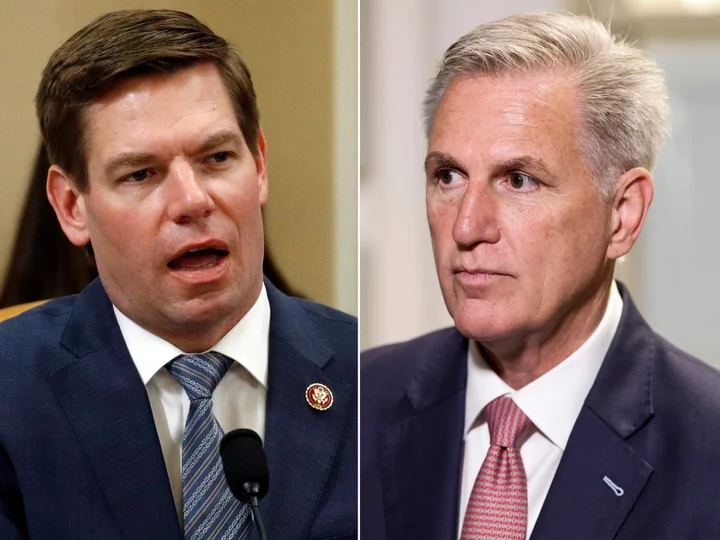
Kevin McCarthy and Eric Swalwell’s heated exchange on House floor revealed
New details reveal that California Rep Eric Swalwell did not hold back when criticising Speaker Kevin McCarthy last month, reportedly calling him a “p****” on the House floor. According to The Daily Beast, the heated exchange stemmed from the events of 21 June, when Republicans voted to censure California Democratic Rep Adam Schiff. As Democrats chanted “Shame!” at their colleagues across the aisle, Mr Swalwell, standing near the speaker’s podium, had something to say to one Republican in particular – Mr McCarthy. “This is pathetic,” Mr Swalwell allegedly said to the House speaker, according to two members of Congress who spoke to the outlet. “You’re weak. You’re a weak man.” Mr McCarthy looked like “he had a vein popping out of his forehead,” one lawmaker told the outlet. Another said the House speaker stared down Mr Swalwell for roughly 10 seconds before deciding to walk away. The next day, the beef between the two lawmakers intensified. Just before Indian Prime Minister Narendra Modi gave a joint address to Congress, Mr Swalwell was right outside the chamber on the Republican side when Mr McCarthy reportedly spotted him. “McCarthy said, ‘If you ever say something like that to me again, I’m gonna kick the s*** out of you,’” one member told The Daily Beast. Another lawmaker expanded on this, recalling: “They were in each other’s faces. Basically nose-to-nose. And Rep Swalwell said something like, ‘Are we really gonna do this?’” The House speaker then allegedly threatened the California Democrat: “Call me a p**** again, and I’ll kick your a**.” Both lawmakers speaking to the outlet apparently recalled the next words from Mr Swalwell identically: “You. Are. A. P****.” But Mr McCarthy did not fulfill his promise, and instead the two congressmen stared each other down before McCarthy stepped to the side. The Independent has reached out to the offices of Speaker McCarthy and Mr Swalwell for comment. The bad blood between the Californians has been spilled before; back in January, shortly after McCarthy became speaker, he booted Mr Swalwell – as well as Mr Schiff – from the House Intelligence Committee. This also isn’t the first documented instance of name-calling in the recent past among Congress members. Georgia Republican Rep Marjorie Taylor Greene called Colorado Republican Rep Lauren Boebert a “little b****” last month on the House floor. Read More ‘Shame!’McCarthy booed and heckled on House floor after ‘phony’ censure against Democrat Adam Schiff White House attacks McCarthy’s impeachment gambit as ‘ridiculous, baseless stunt’ Marjorie Taylor Greene attacks special counsel Jack Smith as ‘little b****’ for Democrats Republican-led committee calls off vote to hold Meta's Mark Zuckerberg in contempt White House attacks McCarthy’s impeachment gambit as ‘ridiculous, baseless stunt’ Biden is welcoming far-right Italian Prime Minister Meloni for White House talks
2023-07-29 00:55
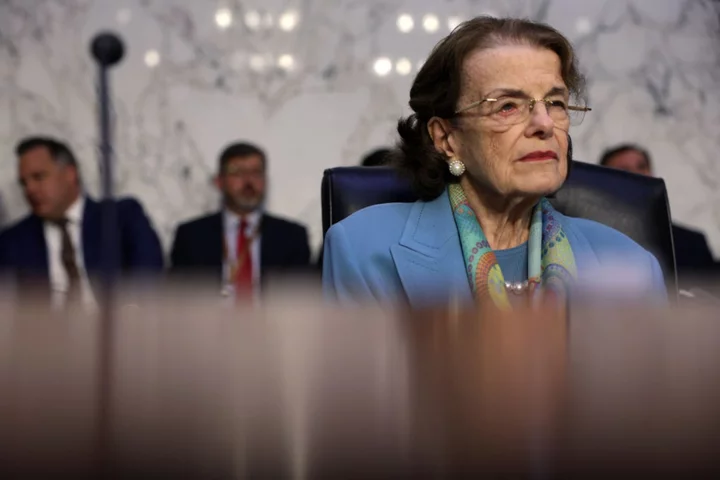
Sen Dianne Feinstein appears confused and is instructed to vote ‘aye’ by fellow senator at meeting
One of the frequent instances in which Senator Dianne Feinstein has appeared confused and unsure of the business of the Senate at hand has been caught on camera, a day after Senate Minority Leader Mitch McConnell froze at a press conference and was ushered away after appearing unable to talk. The Democratic senator from California was attending a meeting Thursday of the Senate Appropriations Commitee, where during votes she appeared to lose track of the proceedings and began to motion for a vote that was already in progress. The beginning of her speech prompted a fellow Democratic senator, Patty Murray, to lean in and tell her: “Just vote ‘aye’”. It was a concerning moment made all the more relevant by the display of Mr McConnell a day earlier; after pressing from reporters throughout the afternoon and into the evening, it was eventually born out that the Senate GOP leader, who suffered a concussion after a fall this past spring, was the victim of another fall just a few weeks ago at DC’s Reagan airport. The incident was branded “awkward” by NBC’s congressional reporter Sahil Kapur, and it drew the issue of the Senate’s graying membership back into the headlines for a second day in a row. A spokesperson for the senator offered this explanation to Fox News: “Trying to complete all of the appropriations bills before recess, the committee markup this morning was a little chaotic constantly switching back and forth between statements, votes, and debate and the order of bills. The senator was preoccupied, didn’t realize debate had just ended and a vote was called.” "She started to give a statement, was informed it was a vote and then cast her vote,” they continued. Ms Feinstein, 90, is one of the chamber’s oldest members and has long been the subject of stories and anecdotes wherein she appears unsure or confused about her immediate surroundings or the proceedings of the Senate. The concerns have escalated to the point where there are now persistent calls for her retirement on social media, something that the senator has pledged to do at the end of her term. A crowded field has already emerged to vie for her seat next year; California US House members Adam Schiff, Barbara Lee and Katie Porter are all contending to succeed her in what is expected to be one of the most expensive statewide races in 2024. The senator returned to work earlier this year after a two-and-a-half month absence, related to illness; the void left by her leave prevented the Senate Judiciary Committee’s Democratic majority from compelling Supreme Court Justice John Roberts to testify at a hearing called to discuss ethical issues plaguing the nation’s highest judicial authority. Read More AP Week in Pictures: North America Mitch McConnell leaves press conference abruptly after appearing unable to speak Mitch McConnell’s abrupt silence spurs fresh calls for term limits
2023-07-29 00:24
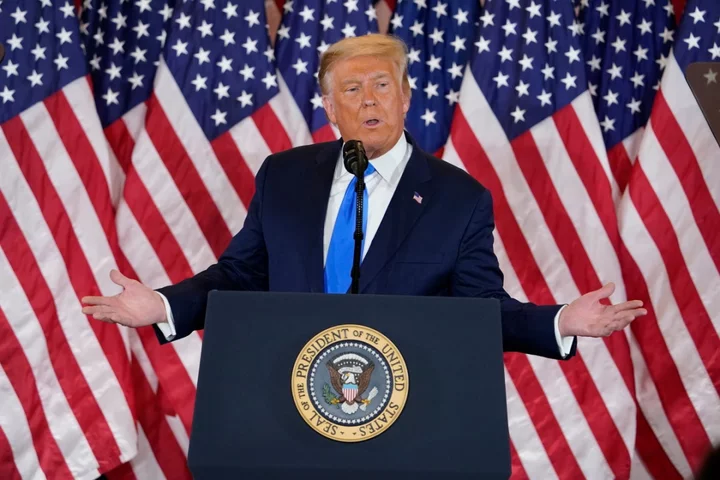
Read Donald Trump’s new superseding indictment in classified documents case in full
Donald Trump was hit with a new set of federal charges on Thursday related to his alleged mishandling of classified documents since leaving the White House in January 2021. Mr Trump and his aide Walt Nauta had already been charged in Justice Department special counsel Jack Smith’s investigation into the retention of government documents at the former president’s Mar-a-Lago home in Palm Beach, Florida. Now, the new superseding indictment brings fresh charges against the two men and also makes a formal allegation against a third man – Mar-a-Lago property manager Carlos De Oliveira. Prosecutors have accused the three men of plotting to deleting security footage from Mar-a-Lago in order to conceal potential evidence of misconduct. The fresh charges come at a time when Mr Smith is also pursuing another probe into Mr Trump over his efforts to overturn the result of the 2020 presidential election and his role in the Capitol riot of 6 January 2021. Here you can read the superseding indictment in the classified documents case in full: Read More Trump news – live: Trump hit with new charges in classified documents case as Mar-a-Lago aide indicted Trump hit with more charges as Mar-a-Lago worker added to documents case Carlos De Oliveira: Who is second Trump aide now charged in Mar-a-Lago secret documents case Is Donald Trump going to prison?
2023-07-28 17:53
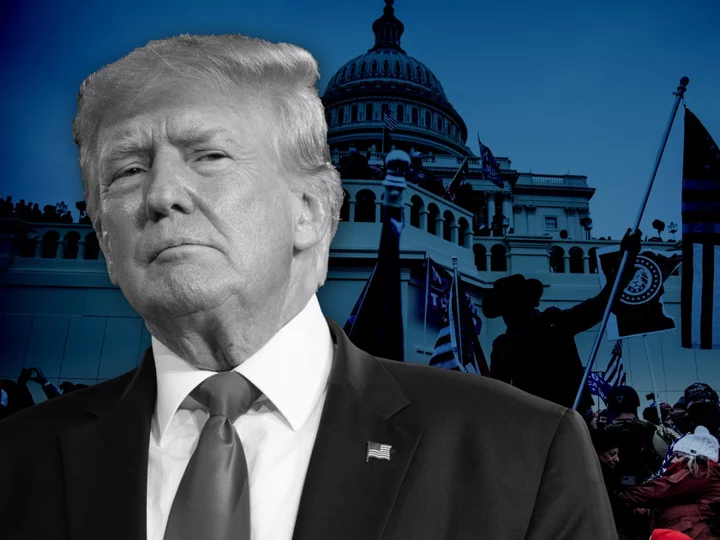
Trump’s election fraud claims were always bogus. Will his history of lies finally catch up to him?
Former president Donald Trump’s attempts to undermine the results of elections that his rivals have won are now at the centre of a sprawling federal investigation, one that follows an avalanche of lies and conspiracy theories about the democratic process and a campaign to overturn the votes of millions of Americans. Lawsuits from his legal team and Trump allies were shot down in court. His own administration and campaign failed to produce any evidence. But his false and inflated claims, spanning more than a decade, have sowed enough doubt among his supporters to construct the lie of “stolen” and “rigged” elections, animating Republican attempts to challenge results and craft legislation to do what Mr Trump failed to do in the courts. A persistent lie that the election was stolen from him fuelled violence at the US Capitol on 6 January, 2021, sustained partisan investigations intended to reverse the outcomes in states he lost, inspired Republican-led legislation in nearly every state to change how elections are run, and has formed the basis of Mr Trump’s 2024 campaign. Did he believe the “truth” of his claims? And how often was he told, by both his advisers and White House officials, that he was wrong? These are questions that prosecutors are likely considering as US Department of Justice special counsel Jack Smith and his team weigh another federal indictment against the former president, but they won’t need to establish that he was aware that he was spreading misinformation to charge him for a range of potential election-related crimes. Years of evidence, however, suggests that he knew what he was saying was false, or that he should have known he was not telling the truth, when he waged his assault on an election he lost to Joe Biden. A history of ‘sham’ and ‘rigged’ elections He told his followers to “march on Washington and stop this travesty.” He told them to “fight like hell and stop this great and disgusting injustice”. “The world is laughing at us,” he said. “This election is a total sham and a travesty. We are not a democracy! Our country is now in serious and unprecedented trouble ... like never before.” It was 7 November, 2012, and Barack Obama’s election night defeat of Mitt Romney sent Donald Trump into a Twitter tailspin. Most of those messages were later deleted, but similar statements were repeated often and in public in the years that followed, including on a stage in Washington DC that day a mob of his followers stormed the halls of Congress on 6 January, 2021. Four years after raging over 2012 results, after he came in second place in the Iowa caucus for the Republican nomination for president, Mr Trump said his then-rival Ted Cruz “stole” the primary from him. “Ted Cruz didn’t win Iowa, he stole it. That is why all of the polls were so wrong and why he got far more votes than anticipated. Bad!” he said on Twitter in February 2016. He called for a new election or for the votes to be “nullified”. In August 2016, during a campaign stop in Ohio, he said he is “afraid the election’s going to be rigged” – a statement based on nothing. But that summer, however, Republican operative Roger Stone called on then-candidate Trump to talk about voter fraud “constantly”. He told Breitbart: “He needs to say for example, today would be a perfect example: ‘I am leading in Florida. The polls all show it. If I lose Florida, we will know that there’s voter fraud. If there’s voter fraud, this election will be illegitimate, the election of the winner will be illegitimate, we will have a constitutional crisis, widespread civil disobedience, and the government will no longer be the government.’” Mr Trump “will go to the places other politicians won’t, and he’s probably the only person to run for president within the last 50 years who would dare to do this, and might even get away with it,” Stone added. Then-candidate Trump would later tell Fox News host Sean Hannity that there are “1.8 million people who are dead, who are registered to vote, and some of them absolutely vote.” “Of course there is large-scale voter fraud happening on and before election day. Why do Republican leaders deny what is going on? So naive!” he said on Twitter that same week. A voter fraud commission that found no evidence of voter fraud Shortly after entering office in 2017, Mr Trump established a Presidential Advisory Commission on Election Integrity, chaired by his then-Vice President Mike Pence. Kris Kobach, then the secretary of state of Kansas and a key architect of GOP election laws, was appointed as vice chair. Other members of the commission included members of influential right-wing think tanks like the Heritage Foundation and the Public Interest Legal Foundation, which have also advanced restrictive voting laws under the “election integrity” banner. In July 2017, Mr Kobach requested every state to provide a list of all registered voters, the last four digits of their Social Security numbers, their addresses, dates of birth, political affiliation, and voting history. Mississippi’s Secretary of State Delbert Hosemann said the commission’s request “can go jump in the Gulf of Mexico”. Virginia’s then-Governor Terry McAuliffe said he had “no intention” to respond to the commission’s request. “This entire commission is based on the specious and false notion that there was widespread voter fraud last November. At best this commission was set up as a pretext to validate Donald Trump’s alternative election facts, and at worst is a tool to commit large-scale voter suppression,” he said in a statement at the time. He added that the only “irregularity” stemming from the 2016 presidential election involved Russian troll farms to sow political and social discord and boost Mr Trump’s candidacy. On 3 January, 2018, Mr Trump announced that he was dissolving the commission. “Despite substantial evidence of voter fraud, many states have refused to provide the Presidential Advisory Commission on Election Integrity with basic information relevant to its inquiry,” he said in a statement at the time. “Rather than engage in endless legal battles at taxpayer expense, today I signed an executive order to dissolve the Commission, and have asked the Department of Homeland Security to review these issues and determine next courses of action.” The commission released its documents six months later, after a lawsuit from Maine’s secretary of State and commission member Matthew Dunlap argued that instead of “widespread evidence of fraud” the commission’s findings “actually reveals a troubling bias.” Mr Dunlap said that the commission’s “purpose was not to pursue the truth but rather to provide an official imprimatur of legitimacy [from] President Trump’s assertions that millions of illegal votes were cast during the 2016 election and to pave the way for policy changes designed to undermine the right to vote.” There exists “no single document that reveals there is no widespread voter fraud,” according to Mr Dunlap, but evidence that fails to substantiate the president’s claims. A disinformation campaign before a single vote was cast Before he publicly and repeatedly cast doubt on the legitimacy of mail-in ballots and the results of the 2020 election, then-President Trump was reportedly so impressed with his administration’s work in election security that he planned a press conference around it. Months before Election Day, intelligence officials met with Mr Trump and other White House officials on 14 February, 2020 to review potential threats to that year’s election and assured the president they had no concerns about its integrity. That briefing came one day after a House committee hearing with intelligence officials who warned lawmakers that Russia was likely interfering in 2020 campaigns to boost Mr Trump’s chances of re-election. Days later, Mr Trump fired Joseph Maguire, the acting director of national intelligence who testified at that hearing. He was immediately replaced with Richard Grenell. That press conference never happened; Mr Trump continued his narrative that elections, particularly those in which Republicans lose, are corrupt. In March 2020, as election officials prepared for an increase in voting by mail during the onset of the Covid-19 pandemic, Mr Trump told Fox News that higher voter turnout would be a political disaster for Republicans. “The things they had in there were crazy,” he said of Democratic proposals for emergency coronavirus aid. “They had levels of voting, that if you ever agreed to it you’d never have a Republican elected in this country again.” Mr Trump vowed to block such emergency funding for the US Postal Service, specifically to prevent expanded access to voting by mail. “They need that money in order to make the Post Office work so it can take all of these millions and millions of ballots,” he told Fox Business in August 2020. “But if they don’t get those two items, that means you can’t have universal mail-in voting, because they’re not equipped to have it.” Mr Trump and Republicans have repeatedly claimed without evidence that “universal mail-in voting” – in which any eligible voter can request an absentee ballot – is ripe for fraud. “Republicans should fight very hard when it comes to state wide mail-in voting. Democrats are clamoring for it,” Mr Trump said in April 2020. “Tremendous potential for voter fraud, and for whatever reason, doesn’t work out well for Republicans.” Proponents have often defended those claims by pointing to a 2005 report from the Commission on Federal Election Reform, co-chaired by former President Jimmy Carter and former Secretary of State James A Baker III. The report noted that because voting by mail takes place outside of polling locations, there is an increased potential for fraud, but does not say that any such fraud has occurred on the scale Mr Trump has alleged. The report goes on to state that when safeguards are in place – like in Oregon, where voters have exclusively voted by mail since 1998 – fraud was virtually nonexistent. False claims and mischaracterisations about the report prompted former President Carter to issue a rare public statement in May 2020 urging political leaders “to take immediate steps to expand vote-by-mail and other measures that can help protect the core of American democracy – the right of our citizens to vote.” After court rulings struck down his attempts to challenge vote-by-mail policies, and as he campaign failed to find evidence, then-President Trump routinely used his bully pulpit at the White House and on stage at his campaign rallies to launch a flood of false claims spread widely among his supporters and on social media. When a federal judge ordered his campaign to “produce such evidence in their possession, and if they have none, state as much,” attorneys produced evidence pointing to only a handful of election fraud cases – none of which involved mail-in ballots. A legal effort to overturn results while aides told him he lost By Election Day in 2020, then-President Trump made dozens of false or misleading statements about voter fraud and voting by mail within that year alone. He kept going within hours after polls closed on 3 November. “A big WIN!” he wrote on Twitter at 12.45am that night. “We are up BIG, but they are trying to STEAL the Election. We will never let them do it. Votes cannot be cast after the Polls are closed!” he wrote minutes later. At a news conference hours later, he claimed a “very sad group of people” are “trying to disenfranchise” his supporters before listing states that he falsely claimed to have won. “Frankly, we did win this election,” he said. “So our goal now is to ensure the integrity, for the good of this nation. This is a very big moment. This is a major fraud on our nation.” Over the following days and months, he continued to suggest that the late-counted mail-in ballots for Mr Biden that changed the outcome in states that he lost were evidence of fraud, after he spent months denigrating absentee ballots and urging his supporters to cast their votes in person. A flurry of legal challenges and partisan legislative hearings targeted election laws and outcomes in states that he lost; none produced any evidence of widespread fraud. His legal team largely walked away from the effort, except for Sidney Powell and Rudy Giuliani, who are now facing defamation claims and professional sanctions for amplifying the same baseless claims. In November 2020, one week after the election, Mr Krebs said in a statement through his agency that “there is no evidence that any voting system deleted or lost votes, changed votes, or was in any way compromised.” That sentence was highlighted in bold in the statement. Mr Trump fired him with a tweet. The House select committee investigating the events surrounding January 6 found that Mr Trump’s senior advisers told him on 12 November, 2020, that he lost the election – not from fraud, but because more people voted for Mr Biden. Mr Trump was then reportedly furious with his Attorney General Bill Barr when he told the Associated Press in December 2020 that “to date” no agency has seen any evidence of fraud “on a scale that could have affected a different outcome in the election.” That month, John Eastman – a Trump-linked attorney who organised the so-called “alternate” elector scheme – also warned the campaign against repeating debunked data in a suit targeting Georgia’s election results. Mr Trump was “made aware that some of the allegations (and evidence proffered by the experts) has been inaccurate,” Mr Eastman wrote, according to court filings. “For him to sign a new verification with that knowledge (and incorporation by reference) would not be accurate.” That email from Mr Eastman underscores what federal prosecutors are likely now examining: That Mr Trump’s team was aware that the arguments they were making were indefensible, and that the man who was insisting on them knew that. Judge Carter also pointed to an email from a Trump attorney that said “merely having this case pending in the Supreme Court, not ruled on, might be enough to delay consideration of Georgia.” “This email, read in context with other documents in this review, make clear that President Trump filed certain lawsuits not to obtain legal relief, but to disrupt or delay the January 6 congressional proceedings through the courts,” wrote Mr Carter, alleging a similar tactic that Mr Trump has used to squash investigations and lawsuits against him for years. The House committee spent a year and a half on its investigation, including a series of blockbuster public hearings laying out evidence and witness testimony describing the depth of Mr Trump’s attempts to remain in office at whatever cost. The panel’s final 845-page report provides a detailed account of Mr Trump’s refusal to cede power – regardless of the outcome of a democratic election – while his close advisers told him that he lost. In his interview with the House select committee, Trump adviser Jason Miller said he had “several” conversations with Mr Trump that his claims were wrong. Mr Barr told the committee that Mr Trump’s claims were “detached from reality”. Mr Barr and other administration officials also said they tried to debunk conspiracy theories surrounding Dominion Voting Systems, which recently settled with Fox News for $787m in a landmark defamation case against the network. But Mr Trump went on to tweet about Dominion nearly three dozen times from November 2020 up until the attack on the Capitol on January 6. In a text message reviewed by federal prosecutors, Mr Trump’s own chief of staff Mark Meadows joked with a White House lawyer about his false claims of voter fraud in Georgia. The former president has continued a narrative of political persecution as he seeks the 2024 Republican nomination for president, with a reliable mention of “stolen” or “rigged” election in speeches and on his Truth Social platform. Mr Trump, who has reliably turned to projection in his rhetorical playbook, is now referring to the multiple investigations and indictments against him as their own form of politically motivated “election interference” to stop him from reaching the White House. Read More Trump news – live: Trump and aides charged with plotting to delete security footage in classified docs case All the lawsuits and criminal charges involving Trump and where they stand Is Donald Trump going to prison? Biden will sign an executive order in Maine encouraging new inventions to be made in the US All the investigations Trump still faces following his second arrest What charges does Donald Trump face in the classified documents case?
2023-07-28 17:46
